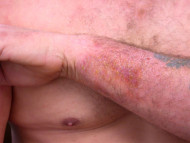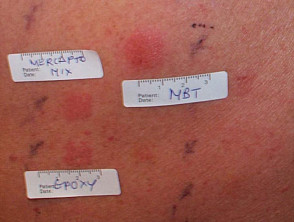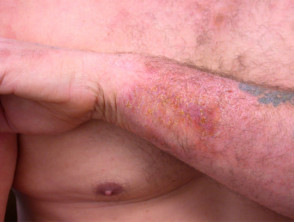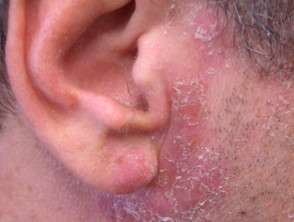What is epoxy resin?
Epoxy resin is a chemical that is part of an epoxy resin system. Epoxy resin systems are used widely in industry because of their strong adhesive properties, chemical resistance and toughness. Common two-part epoxy resin systems contain epoxy resin, catalysts/curing agents, and diluents and/or other additives. Any of these chemicals on their own may cause irritant and/or allergic contact dermatitis. Cured epoxy resin (the fully hardened combination of the epoxy resin system chemicals) should be non-irritating and non-sensitising.
| Epoxy-resin system component | Features |
| Epoxy resin (uncured) |
|
| Catalysts/curing agents |
|
| Diluents/additives |
|
Where is epoxy resin found?
Most people associate epoxy resin with glues and adhesives. Epoxy glues such as Araldite® are often used by home DIY'ers and hobbyists. These glues usually come in two parts, the hardener and the resin. When mixed, it is claimed that the resulting compound can stick almost anything together. The table below shows other uses of epoxy resin.
| Uses of epoxy resin |
|
|
|
|
What are the reactions to epoxy resin allergy?
Typical allergic contact dermatitis reactions may occur in individuals allergic to epoxy resin or other components of an epoxy resin system. The uncured epoxy resin, hardener and diluent are powerful irritants and potent sensitisers. Skin contact with the hardening agent may cause severe burns. They can also cause a severe allergic contact dermatitis characterised by redness, swelling and itching. Skin should be washed with soap and water if any contact occurs. In addition, hardeners and diluents are more volatile than resin and may cause allergic reactions from breathing in fumes.
Cured epoxy resins are seldom a problem but it has been found that measurable amounts of uncured reagents may remain in the "cured" resin after 1 week.
Epoxy resin dermatitis
Am I allergic to epoxy resin?
Epoxy resin allergy is diagnosed from the clinical history and by performing special allergy tests, called patch tests.
Standard patch testing with test epoxy resin material 1% in acetone or petrolatum will usually find 75% of those allergic to epoxy, even though not every epoxy resin has the same chemical structure. The standard test does not test to the hardener, but most individuals allergic to hardeners are also allergic to the resin. Thus screening for epoxy allergy is done using the epoxy resin.
Chances of developing an allergic reaction increase with the amount and concentration of epoxy resin exposure. There is a small risk of causing allergy to develop from patch testing so the tests should only be done in at risk individuals.
Treatment of contact dermatitis due to epoxy resin exposure
If you are diagnosed with epoxy resin allergy then avoid exposure to epoxy containing products, otherwise take means to reduce potential exposure.
Washing the area immediately with soap and water should treat accidental exposure from glue or paints. Sometimes, solvents (acetone, alcohol, or methyl-ethyl ketone) can be used to reduce the exposure. However, routine use of these chemicals is not recommended, as they tend to dry and irritate the skin.
Dermatitis can be treated as for any acute dermatitis/eczema, with topical corticosteroids, emollients, antibiotics for any secondary bacterial infection (Staphylococcus aureus), etc.
What should I do to avoid epoxy resin allergy
When using epoxy glues at home, avoid touching the glue and breathing in fumes.
In the workplace try to avoid exposure to epoxy resins, however, this may not be practicable. Identify potential sources of exposure using Material Safety Data Sheets; these are required for all chemicals and substances that you may come into contact with in the workplace. To reduce exposure, use special gloves (nitrile rubber or nitrile butatoluene gloves) to protect the hands. Rubber gloves do not help as the resin penetrates through the glove in 30 seconds. Vinyl and neoprene rubber are not totally protective.
Allergy is more likely to liquid (low molecular weight) epoxy resin systems used in paints and coating material than to the those used primarily for structural bonding, which have a higher molecular weight.
If you are highly sensitive to epoxy resin be aware of products that may contain it. Apart from obvious sources such as two-part glues and paints, be wary of items such as vinyl or plastic handbags, gloves and jewellery.
Alert your doctor or dentist to the fact that you have an allergy to epoxy resin. Your dermatologist may have further specific advice, particularly if you are highly sensitive to epoxy resin.
Alternative names for epoxy resin
Epoxy resin is also known by several other names. These include:
- Bisphenol A [2,2-bis(4-hydroxyphenyl)propane] (diphenylpropane)
- Diglycidyl ether
- Epichlorohydrin (1-chloro-2,3-epoxypropane) (8-chloropropylene oxide)
- 4,4’-Isopropylidenediphenol-epichlorohydrin
Avoid all of these. At work, request a material safety data sheet to help identify potential sources of exposure.
Further information
Sensitiser: uncured epoxy resin
Patch Test:
1% epoxy resin in acetone or petrolatum
| Sources of Exposure to Epoxy Resin | |
|---|---|
|
|



